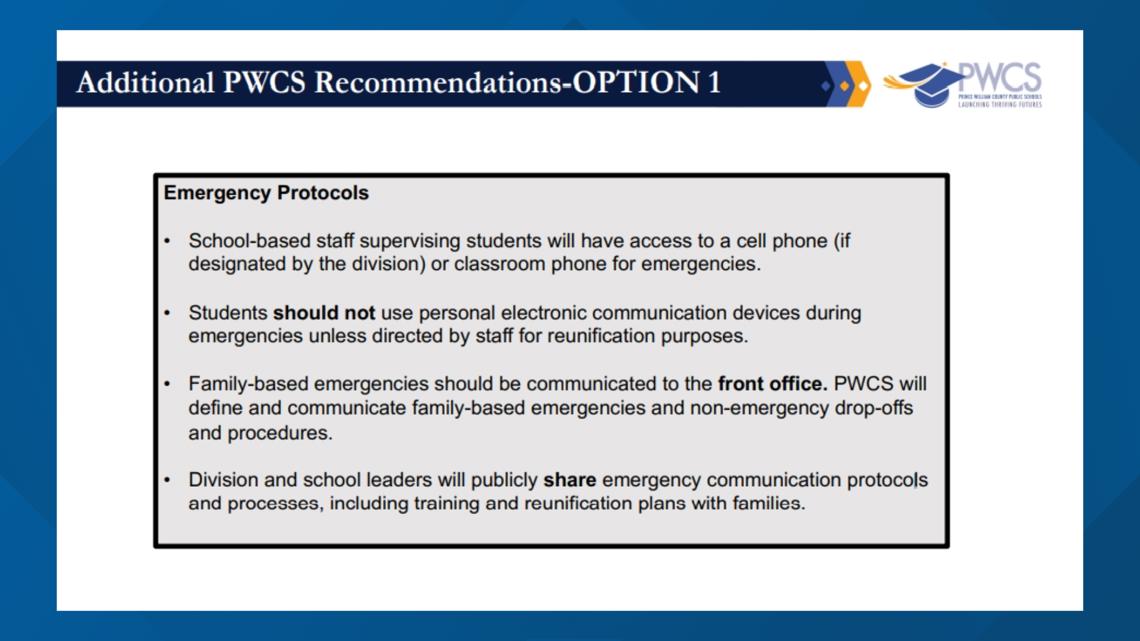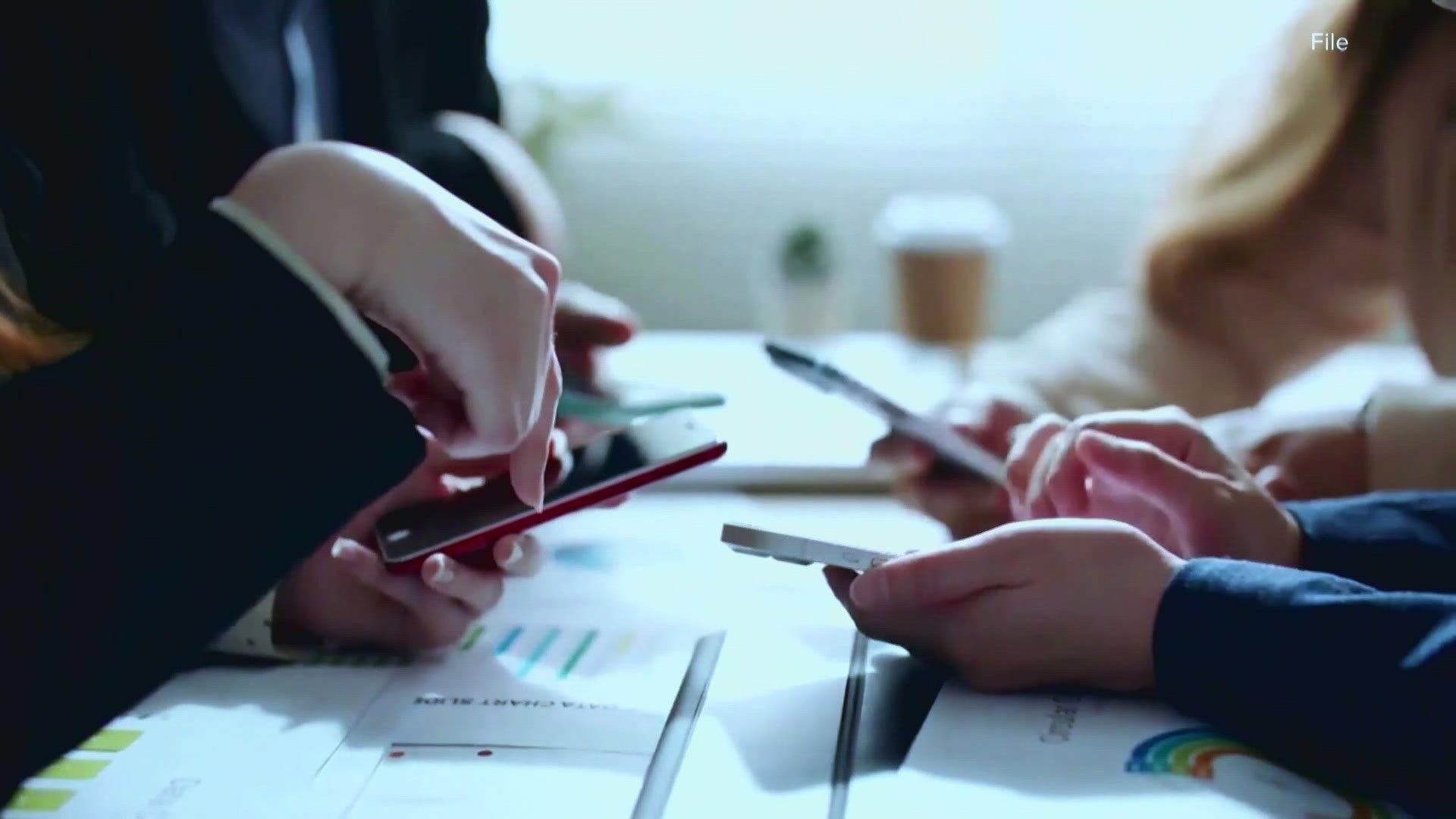PRINCE WILLIAM COUNTY, Va. — The Prince William County School Board will soon vote on their formal cellphone policy.
They currently have a pilot program in the school district. Right now, elementary and middle school students must have their phones silenced and stored away for the entire school day. High school students must have their phones silenced and stored away during class, but area allowed to use their phones during lunch and in between class.
During their most recent school board meeting, an update on how the pilot program is going was shared with the board members.
"We've seen in the pilot at the middle school level, more students engaged with their work, with their colleagues students and friends at lunch," said Dr. Babur Lateef, the Chair of the Prince William County School Board.
They were also presented with two options to choose from moving forward.
Option 1:
Elementary (Pre-K to 5)
- Cellphones or personal electronic communication devices (air pods/headphones and smartwatches) must be turned off and stored away at all times while in the school building and on school grounds.
Middle (6 to 8)
- Cellphones and / or personal electronic communication devices must be turned off and stored away during the school day. Storage starts at the first tardy bell and ends at the dismissal bell.
High School (9 to 12)
- Cellphones and personal electronic communication devices (air pods/headphones and smartwatches) must be turned off and stored away during instructional time.
- Devices and one earbud are allowed during lunch and hallway passing times. Use is prohibited in locker rooms and restrooms.


Option 2:
Elementary (Pre-K to 5)
- Cellphones or personal electronic communication devices (air pods/headphones and smartwatches) must be turned off and stored away at all times while in the school building and on school grounds.
Middle (6 to 8)
- Cellphones and/or personal electronic communication devices must be turned off and stored away during the school day. Storage starts at the first tardy bell and ends at the dismissal bell.
High School (9 to 12):
- Bell-to-Bell Cellphones and/or personal electronic communication devices must be turned off and stored away during the school day. Storage starts at the first tardy bell and ends at the dismissal bell.
"I think we're all guilty of looking at our phones when we should be looking at whoever we're with at the time, you know, whether it's our own children, whether it's our, you know, wives or husbands partners. I think we can all do a better job of engaging with each other," said Dr. Lateef.
In July, Governor Glenn Youngkin issued Executive Order 33, mandating that the Virginia Department of Education (VDOE) develop recommendations for public school districts to enforce cellphone-free policies.
Youngkin explained that bringing cellphone-free education to Virginia’s K-12 public schools is crucial, especially with concerns about youth health issues like depression and anxiety, often linked to heavy social media and cellphone use. He says studies done by the American Psychological Association show on average, children spend about 4.8 hours a day on social media, with recent studies finding that spending more than three hours a day doubles the risk of poor mental health.
In September the Virginia Department of Education, issued guidance as to what "cell-phone free schools" meant.
Elementary Schools (K to 5):
No cellphones or personal electronic communication devices will be allowed to be used by students in school buildings or on school grounds.
Students whose parents decide to send them with a cellphone must turn it off and store it away from themself during the school day.
School divisions will make policies on cellphone usage on school buses where there are elementary students.
If a student needs to communicate non-emergencies to their parents, they must use school-based communication tools and platforms in the office, classroom or other centralized location.
During instructional time, both teachers and parents should use school-based communication tools and channels to communicate emergencies and non-emergencies during the school day. The guidance encourages schools to have a school official available to support students in the event a student needs to be notified of a family emergency.
Middle Schools (Grade 6 to 8):
No cellphones or personal electronic communication devices will be allowed to be used by students during class time.
Students who choose to bring a cellphone must turn it off and store it away from themself during the school day.
School divisions will make local policies on when it is appropriate to use cellphone and personal electronic communication devices outside of class time, before and after school, on school buses, within the school building and on school grounds.
If a student needs to communicate non-emergencies to their parents, they must use school-based communication tools and platforms in the office, classroom or other centralized location.
During instructional time, parents should use school-based communication tools and channels to communicate emergencies and non-emergencies during the school day. The guidance encourages schools to have a school official available to support students in the event a student needs to be notified of a family emergency.
Teachers, co-curricular and extra-curricular advisers must use non-social media based apps to communicate with students about activity and athletic scheduling information during school hours.
Schools should provide students with developmentally appropriate guidance and support on the appropriate use of school-issued technology devices, educational apps and educational tools for academic and for educational research purposes, for both classroom and homework assignments.
High Schools (Grade 9 to 12):
No cellphones or personal electronic communication devices will be allowed to be used by students during class time.
Students who choose to bring a cellphone must turn it off and store it away from themself during the class time.
Outside of class time, cellphones may be used in high schools before and after school.
If a student needs to communicate non-emergencies to their parents, they must use school-based communication tools and platforms in the office, classroom or other centralized location.
If a parent needs to communicate an emergency during class time, they should use school-based communication tools and channels.
Teachers, co-curricular and extra-curricular advisers must use non-social media based apps to communicate with students about activity and athletic scheduling information during school hours.
Schools should provide students with developmentally appropriate guidance and support on the appropriate use of school-issued technology devices, educational apps and educational tools for academic and for educational research purposes, for both classroom and homework assignments.
The only students who may be exempt from these programs are students who have approved accommodations through Individualized Education (IEP) or 504 (Section 504 of the Rehabilitation Act) plans.
The Prince William County School Board will have their first reading and discussion of the policy on November 19. They're expected to vote on the policy on December 4.

